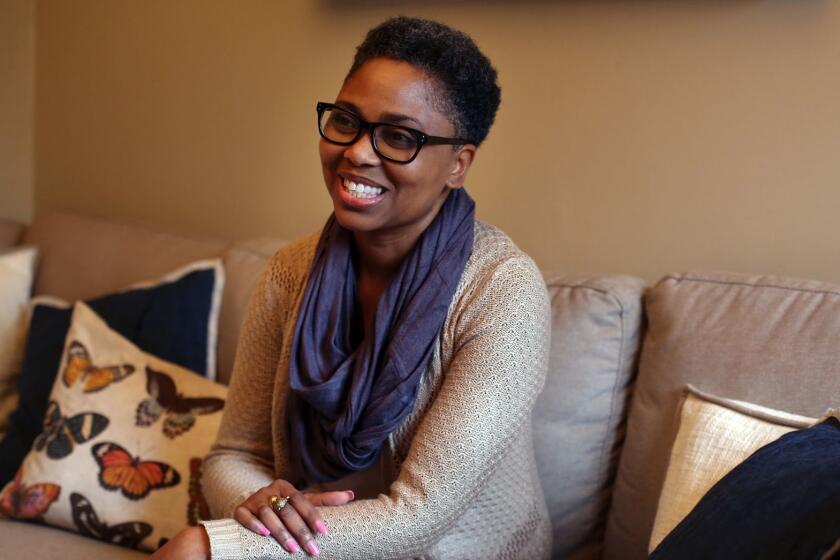How an empathetic new L.A. play showcases a relationship rarely seen onstage
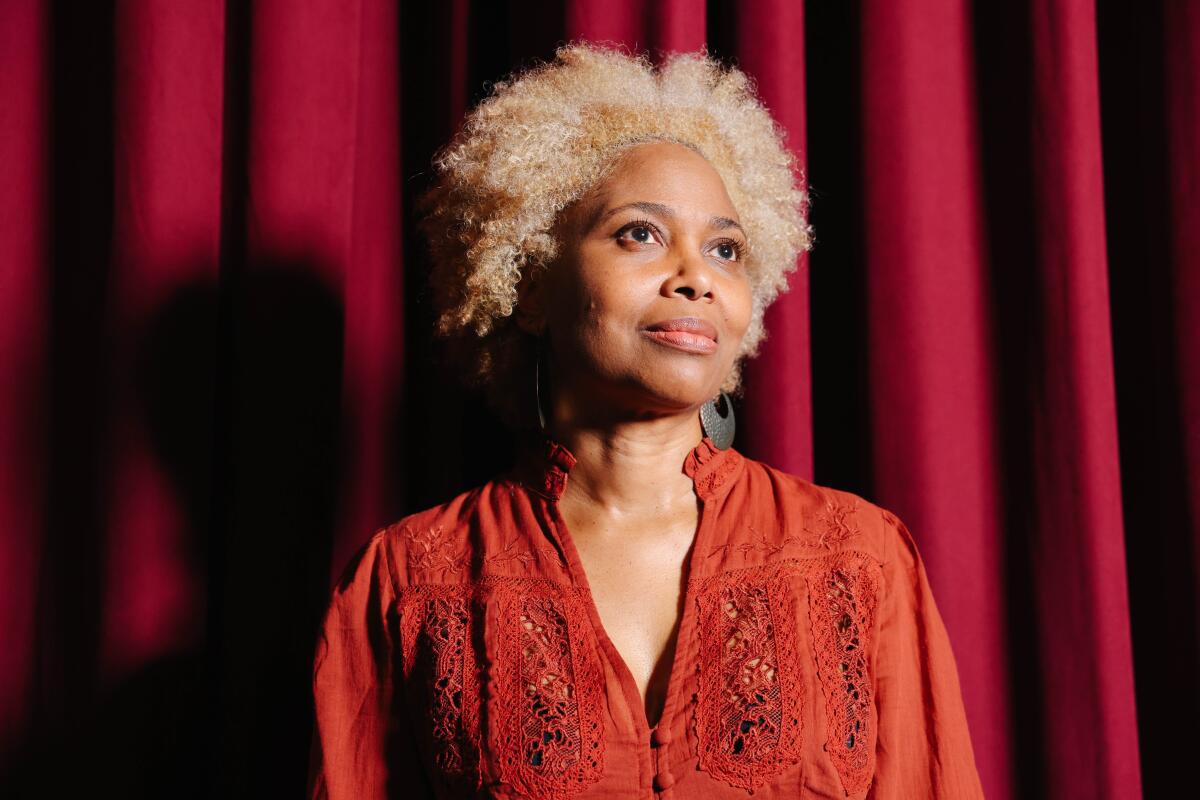
- Share via
When Veralynn Jackson (Julanne Chidi Hill) first meets Mr. Kim (Ryun Yu) at his beauty supply store, she sees an opportunity to look after her daughter while on the job. The only condition? That Mr. Kim be permitted to call Veralynn “Julie.”
The first scene of Inda Craig-Galván’s new play with East West Players, “The Great Jheri Curl Debate,” reflects a similar moment in her mother’s life. Craig-Galván says the name stuck with her mother, Vernell; even family members eventually started calling her Julie.
Now, Craig-Galván is tackling why her mother, who has since died, might’ve accepted the name by exploring the relationship between the two characters. “What allows a grown woman to accept that?” Craig-Galván asks. “To say, ‘Oh, yeah, sure. This person — who is my boss — is going to give me a different name, and I’m going to be OK with that.’ That forced me to look at why she would.”
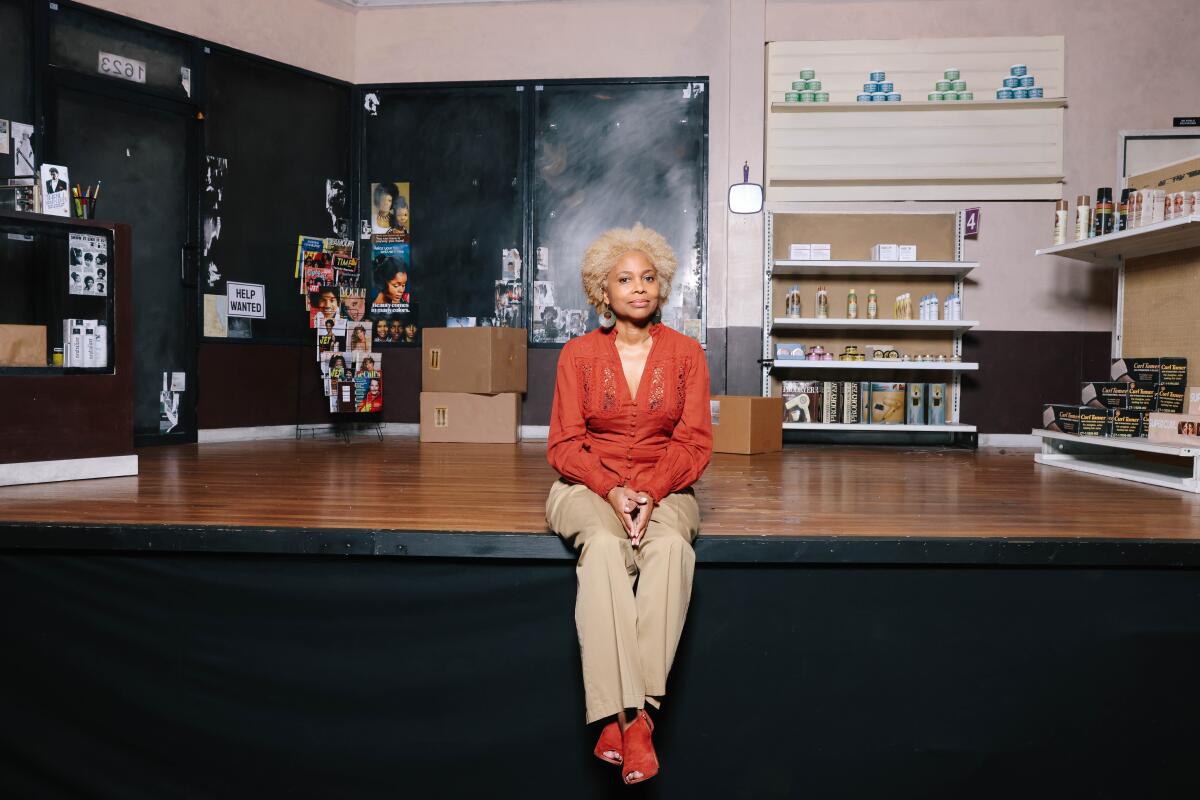
“The Great Jheri Curl Debate,” which was developed through the East West Players’ Playwrights Group, follows Veralynn as she begins working at the Korean-owned Black beauty supply store and finds herself grappling with the invention of the Jheri curl and a new business partnership. As the two characters grow to understand one another, a friendship emerges.
Craig-Galván focuses much of her work — her credits include the play “Black Super Hero Magic Mama” and such TV shows as “The Rookie” and “How to Get Away With Murder” — on the experiences of Black women. “The Great Jheri Curl Debate” presented a new challenge: writing a leading character outside her own race. That required collaboration, empathy and a dedication to developing the characters’ relationship.
All mothers are superheroes, but what kind of strength could carry any parent through the sudden, violent loss of a child?
The East West Players’ Playwrights Group requires participants to have at least one prominent Asian character in their plays. “She wasn’t sure if the group was for her,” says producing artistic director Snehal Desai. “She had never written an Asian character before, and that’s what we wanted her to do.”
Craig-Galván eventually took on the challenge, and when she brought in the first pages of her draft — the opening scene where Mr. Kim calls Veralynn Julie because he can’t pronounce her name — the response was immediate. Dramaturg and Playwrights Group instructor Alice Tuan says, “All the playwrights and I were immediately like, ‘Wow, this is something.’”
What particularly stood out for Tuan was the focus on the relationship between a Korean man and a Black woman, something that often isn’t seen onstage.
The Playwrights Group began in 2019, not long before the start of the COVID-19 pandemic, the growing Black Lives Matter movement and a rise in anti-Asian hate and rhetoric in the U.S. Desai says the play carries a new weight of mutual support among the communities after the events of the last two years.
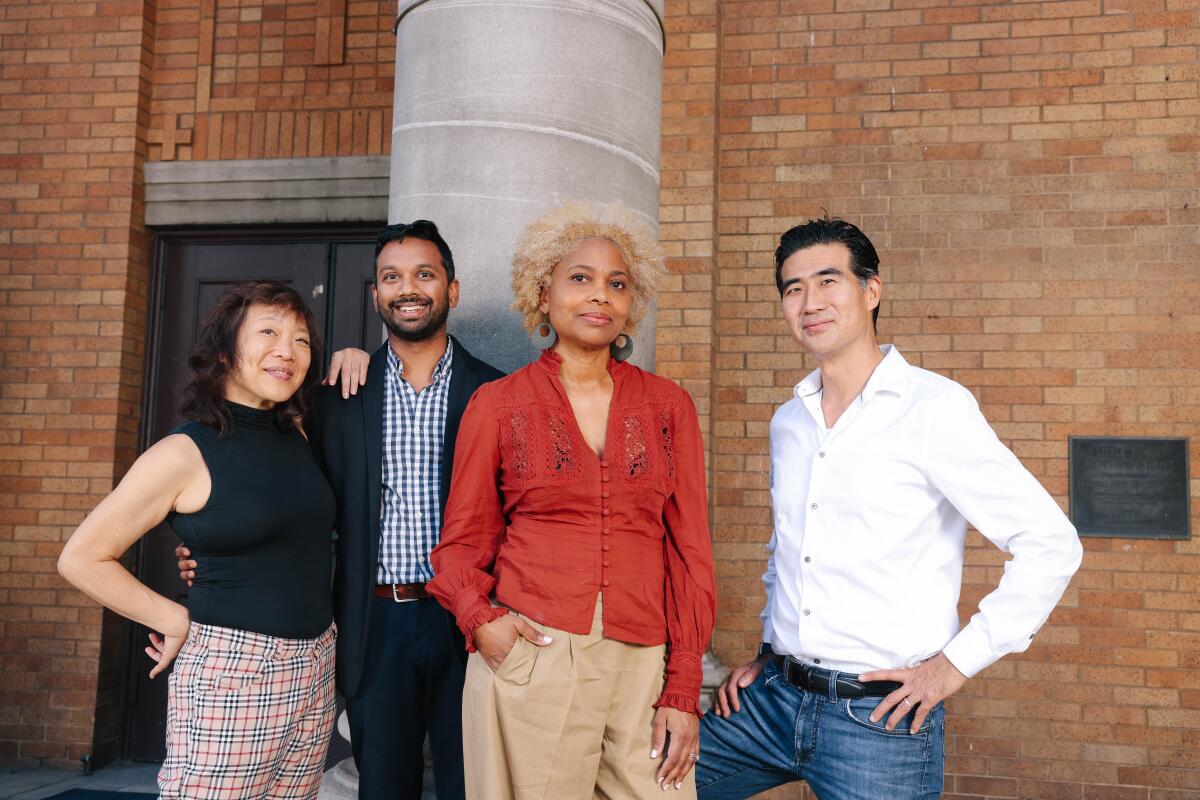
For the record:
5:17 p.m. Oct. 3, 2022In a previous version of this post, the captions said the photos pictured Scarlett Kim. The person pictured is Alice Tuan.
Tuan recalls that, in the beginning, Craig-Galván wrote Mr. Kim so carefully that his character came off as secretive. “She didn’t want to offend, exploit, appropriate — any of that,” she says. “That’s the scary thing about writing outside of your race, and that’s why not a lot of people do it.”
Craig-Galván discovered that the way into Mr. Kim’s character was through his artistic side. His mop became a reminder of his passion for painting. As he mops alone in the shop, the world comes alive around him with colorful lighting. It splatters and evolves as the mop becomes a giant paintbrush. His love for art helps him connect with Veralynn and her love for wig-making. Eventually, he supports her passion in the shop.
“My concern as I was writing was to make sure Mr. Kim was a fully realized, layered human being, that I understood his grief and that, hopefully, the audience would understand,” Craig-Galván says.
She did research on Korean immigrants who own beauty supply stores to get a better understanding of Mr. Kim. She also worked with director Scarlett Kim and assistant director Jungmok Yi to ensure that the way the two leads spoke with one another felt genuine.
“Getting the language right was super important and understanding all of the nuances and the idioms for certain words being used versus other words. That was so helpful,” Craig-Galván says.
During the play’s workshopping with East West Players, Ryun Yu — who plays Mr. Kim — immediately felt the empathy and respect Craig-Galván had poured into his character.
“From the first moment I read it, I was like, ‘Wow, this is really something special,’” Yu says. “I was really excited by the character, and I was amazed that Inda, who is not Korean, could create something which just felt so right.”
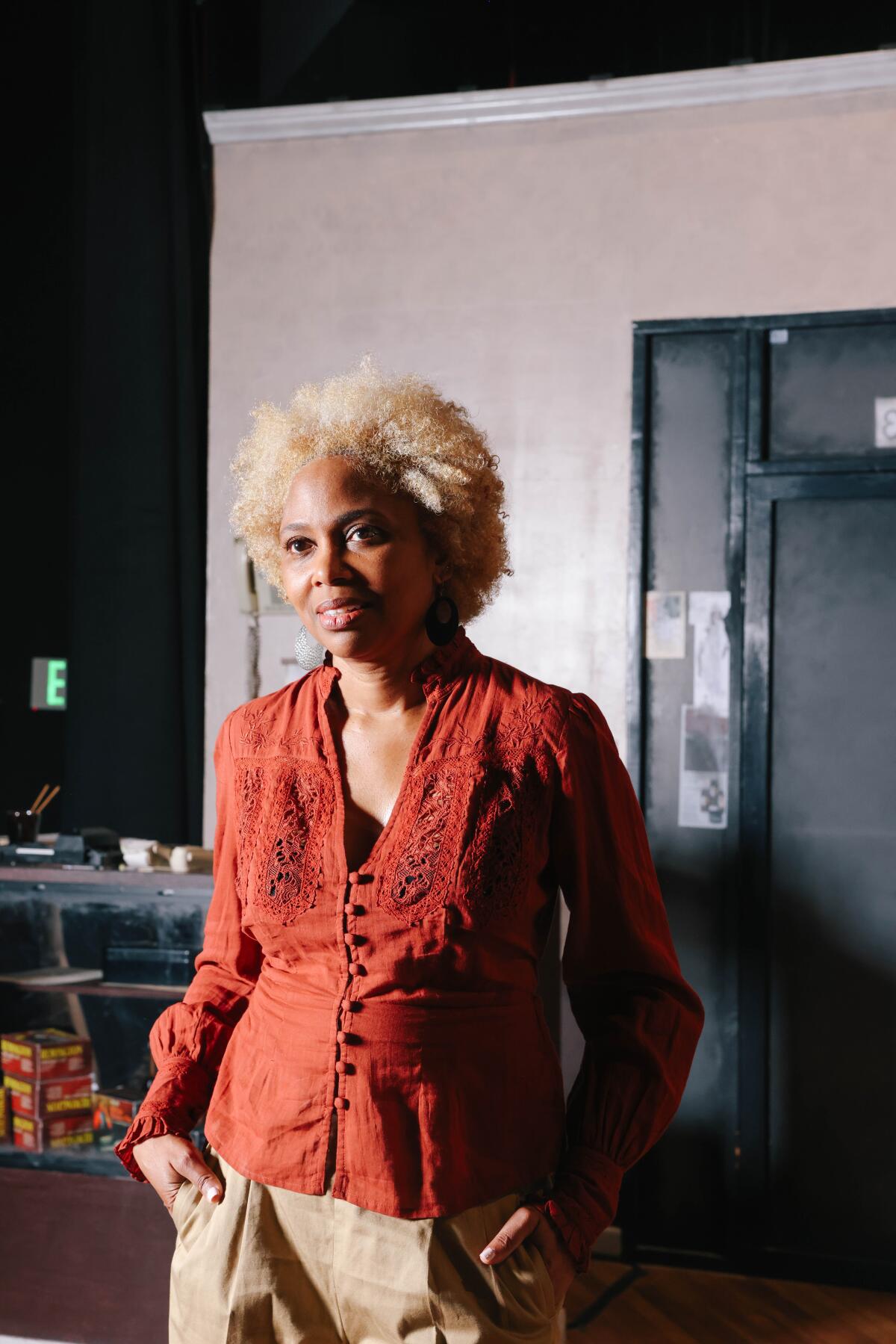
Craig-Galván paid attention to detail and was dedicated from the start to bringing to life every bit of “The Great Jheri Curl Debate” onstage, Kim says. Together with Craig-Galván, Kim created a space that allowed actors to respond and listen to the text, letting them follow their impulses.
During rehearsals, Yu says he felt that something didn’t fully connect between his character and what was in the script, and Craig-Galván felt it too. “She’s very intuitive,” Yu says.
So they talked and she shared more sensitive details about Mr. Kim’s backstory, and “it just rocked my world,” Yu says. “It totally changed my view of [the play].”
Veralynn and Mr. Kim both have preconceived notions about what the other may be like, Craig-Galván says. Mr. Kim immigrated to the U.S. and has learned about the Black community only through the media. Veralynn lives in Chicago, which is segregated at the time of the play, and has interacted with Asian residents only in beauty supply stores.
“I really wanted these two characters to explore that, to question it, to get a better understanding of it in the way you would if you’re in a closed space with somebody for eight hours a day,” Craig-Galván says.
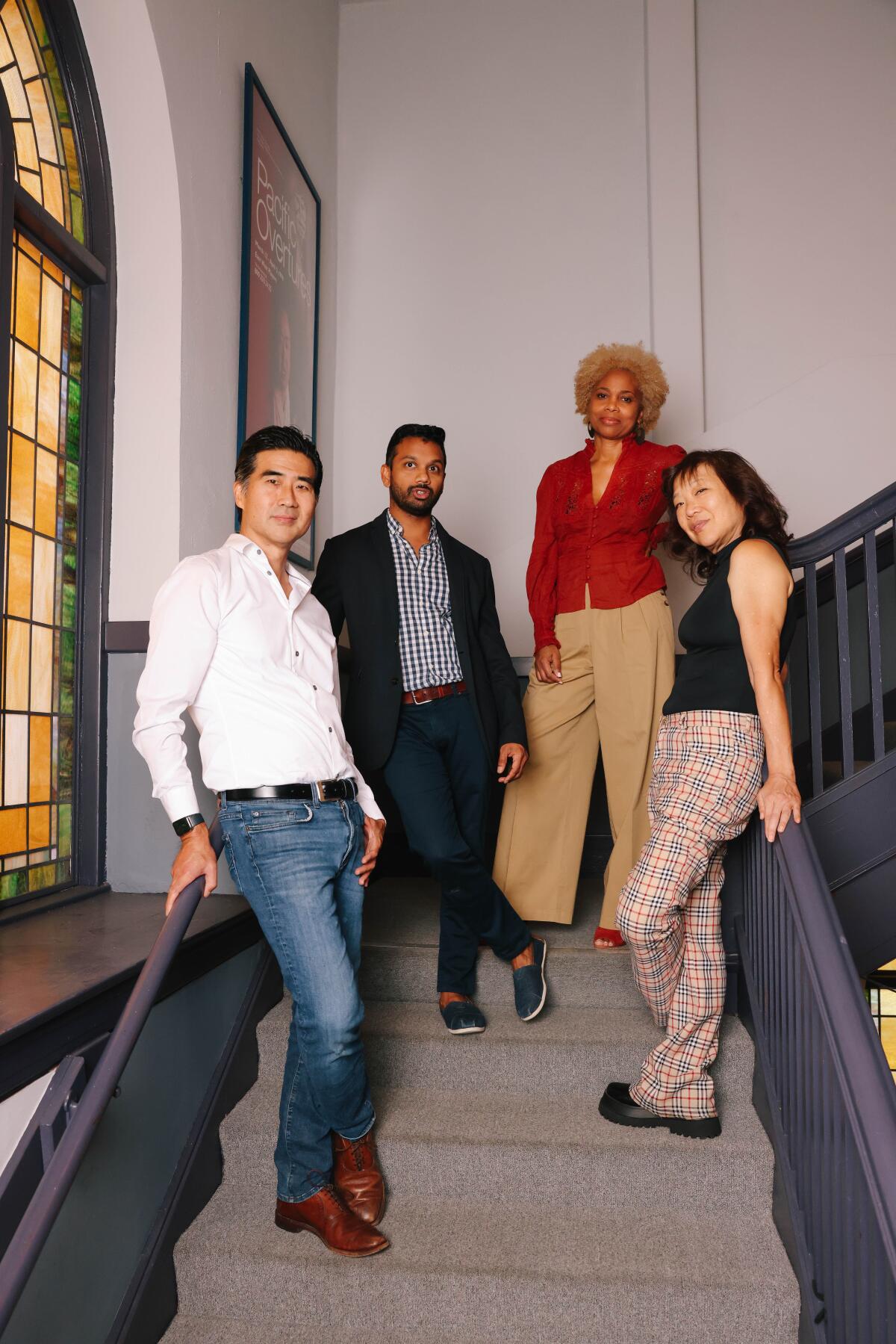
As the characters break away from the miscommunication, they find common ground. Kim recalls a scene where Mr. Kim tells Veralynn to be “more mean” to customers. He explains that the business can’t do too well or else the white landlords will raise the rent.
“They realized, ‘Oh, we are both in relation to white-dominant culture, and that frames our suffering and our existence in a way,’” Kim says.
Kim adds, “I keep calling it a love story because they start seeing each other with love.”
During the play, the two characters start to open up to each other. “It’s like an iceberg where there’s a little tiny bit floating above the surface, but underneath is this whole, well-crafted, three-dimensional world,” Yu says.
Craig-Galván says “The Great Jheri Curl Debate” brings real-life interactions to the stage without the white gaze. “We interact with each other every day, we’ve worked with each other,” she says. “I really am interested in those stories that don’t have anything to do with conflicts over misunderstandings or hatred.”
She adds, “I want to see how we build things, how we react to each other and learn about each other.”
‘The Great Jheri Curl Debate’
Where: David Henry Hwang Theater, 120 Judge John Aiso St.
When: 8 p.m. Fridays, 2 and 8 p.m. Saturdays, 5 p.m. Sundays. Ends Oct. 9
Cost: $25 to $65
Info: eastwestplayers.org or (213) 625-7000
Running time: 90 minutes, no intermission
More to Read
The biggest entertainment stories
Get our big stories about Hollywood, film, television, music, arts, culture and more right in your inbox as soon as they publish.
You may occasionally receive promotional content from the Los Angeles Times.
